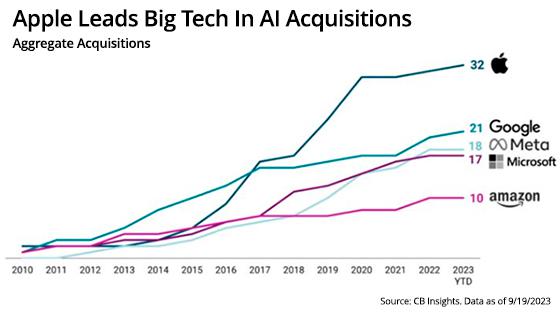
Apple has acquired more than 32 artificial intelligence
(AI) companies since 2010. The latest, earlier this year, is called DarwinAI, a startup focused on making AI systems smaller and faster. Some analysts and execs say Apple has acquired the most AI
businesses of any major tech company.
The deal was forged earlier this year for an undisclosed price, but Bloomberg reported the news today.
Apple has also hired Alexander Wong -- a researcher at the University of Waterloo, who helped build DarwinAI -- as a director of its AI
group.
The $200 billion search market continues to attract new investments from venture capitalists and larger companies such as Apple, Amazon, Google, and Microsoft that are willing to fund
new entrants in generative AI (GAI).
advertisement
advertisement
BrightEdge Founder and Executive Chairman Jim Yu calls these GAI startups the next generation of search engines.
Yu said that while Apple has been
quiet about its investments in GAI, last Year the company announced a $22.6 billion infusion in AI research and development, including GAI, and made more AI-based acquisitions than Meta, Google,
Microsoft and others.
Last year was a big year for investments in GAI, with equity funding topping $21.8 billion across 426 deals, according to CB Insights. OpenAI was the biggest, with $10
billion. In terms of the search space, new entrants such as Perplexity raised money at valuations of $520 million, according to Business Insider, and You.com raised more than $45 million from about 10
different investors.
Google invested $2 billion in Anthropic, adding to its $550 million funding from earlier this year. Amazon also invested $4 billion in Anthropic. And OpenAI is now
reportedly working on a search engine powered by Microsoft’s Bing.
Apple is known for excellence in user experience in its products and software integration, and it also has its own
version of Chat GPT called Ajax internally. AppleCare supports has been beta testing a version called Ask, and this week Behzinga reported that Apple is poaching talent as it builds a potential search
engine.
Yu said the key challenge for new entrants lies not just in building a search engine, but in how they build partnerships and integrate technology into multiple product-led search entry
points.
He also shared new findings and key signals about how Google is ramping up its testing of Search Generative Experiences (SGE) in its Labs.

The data that recognizes these changes comes from BrightEdge Generative Parser, a next-generation
parsing technology that can detect where search engines are experimenting with Generative AI.
While SGE is still in beta, the debate about its rollout continues in some search circles. Yu
points to five key signals that things may be getting closer.
For starters, AI results in SGE have been stable for more than three months; 98% of search queries now show SGE results in
education, ecommerce, and B2B tech; more SGE tests are being run as some users have started to see SGE in Search Labs in Romania, Poland, and Turkey; and new experiments are being tested daily such as
listen buttons, audio and new visual formats with images and video. Most recently Google refreshed its landing page in SGE Labs so users can interact better with its results and formats.